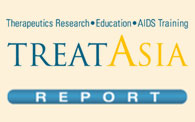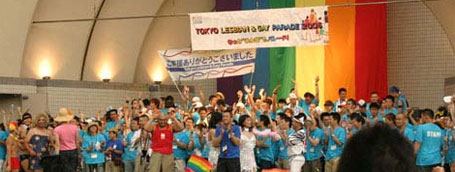Tokyo Lesbian and Gay Parade attracts 3,800

The 2006 Tokyo Lesbian and Gay Parade (TLGP) held last Saturday at Yoyogi Park Event Square in Shibuya attracted approximately 3,800 people despite a heavy downpour 20 minutes before the parade was scheduled to start.
According to the GayJapanNews site, many participants had to walk to the site from the train stations where they were stranded as the torrential downpour and lightning forced the Yamanote rail line, Tokyo's major loop line to shut down temporarily.
This year marks the fifth TLGP although the first ever parade was held in Tokyo in 1994. The event was revived last year after a three-year hiatus following another break in the late 1990s.
The marchers walked through the streets of Shibuya including Shibuya PARCO, Tower Record, Meiji-dori and Harajuku Station before returning to Yoyogi Park.
Japan's first openly lesbian politician, Kanako Otsuji, said: "It was wonderful how even the weather supported us. I was so encouraged by all of the smiles on everyone's faces. I think that society begins to change when so many people can share in an experience of self-affirmation."
Aya Kamikawa, Japan's only transsexual politician, added: "If we do not raise our voices, nobody will know of our existence. If we do not make other people think of us, nothing will change. Let's raise our voices together to make a better future!"
The Pride events continued the following day in Shinjuku Ni Chome, Tokyo's gay district at the Ni Chome Festival. Several blocks were closed to traffic as thousands of people flooded into the area for music, shows, the ceremonial carrying of a Shinto shrine (done to a not-so-traditional choice of music-Madonna), as well as food and drinks.
Japan's second largest Pride event, the Sapporo Rainbow March, which will be held on September 17.
HIV/AIDS "spiraling out of control" in Asia among MSM, new report
HIV/AIDS is "spiraling out of control" in Asia among men who have sex with other men, according to a new survey by the American Foundation for AIDS Research (amfAR) and related group TREAT Asia.

The joint report was released a day before some 20,000 researchers, campaigners and public-health experts converged at the XVI International AIDS Conference in Toronto, Canada which opened on Sunday.
Activists warned on Tuesday that the epidemic is likely to spread because many of these men also marry or have sex with women.
The survey of 23 countries found that HIV rates among MSM could be as high as 28 percent in Bangkok, Thailand; 16 percent in Andhra Pradesh, India; and 14 percent in Phnom Penh, Cambodia, Agence France Presse reported.
Among MSM who were studied in Beijing, half reported having had unprotected anal sex in the past six months, and only 15 per cent considered themselves to be at risk from the AIDS virus.
Researchers also warned that HIV rates among MSM are surging because MSM are difficult to identify and reach through public health campaigns and taboos about homosexuality are undermining education campaigns.
"Given the difficulty of surveillance in these populations, rates of HIV infection could actually be far worse," amfAR's Kevin Frost said.
"This report shines a light on the extent of high-risk MSM behavior and serves as a wake-up call for Asia.
"Unless we address male to male sex and HIV risks and vulnerability, it is going to have a major impact on the general population because a lot of the people we work with are also married," said Shivandanda Khan of Naz Foundation International, a non-governmental organisation that works with men who have sex with men (MSM) in India.
"In our culture it is also compulsory to get married. They have no choice," Khan told reporters.
Many MSM are often married. The report cited that 80 percent of men who admit to having sex with other men in China say they hare married or plan to get married.
It was also revealed that many of the men have dangerously false beliefs about sexual health - up to half of the men in some areas have never used a condom.
"A lot of men in Asia believe that anal sex is safer than vaginal sex," Khan said in an interview.
While in Western countries gay groups have been active in fighting the AIDS epidemic, the "gay identity" is not dominant among Asian men who have sex with other men, the report said.
Thus the advocacy pioneered by gay communities in the Western world over the past 25 years does not work in Asia, where men who have sex with other men are "invisible" and difficult to identify.
"In Africa, Latin America, Asia the current rates of HIV infections among men who have sex with men are really spiraling out of control," said Kevin Frost, AmFAR's vice president for global initiatives.
"The truth is, we shouldn't be in this position. We really cannot afford to relearn the lessons of the past 25 years in many parts of the world, in the developing world, particularly around MSM issues."
Public health experts use the term "men who have sex with men," or MSM, because many of these men are not strictly homosexual or even bisexual. The report revealed that some 65 percent of MSM in Nepal have regular sex with females, and 45 percent of male sex workers have sex with women as well as with men while 22 percent of MSM in Vietnam's Ho Chi Minh City have sex with women as well as men.
An estimated 8.3 million people in Asia are HIV-positive, but some experts believe as many as 12 million more infections could occur within five years if prevention efforts do not improve.












 打印版本
打印版本










读者回应
I wonder if all these were out in the local news or any of the world's news...
Or in the media..
请先登入再使用此功能。